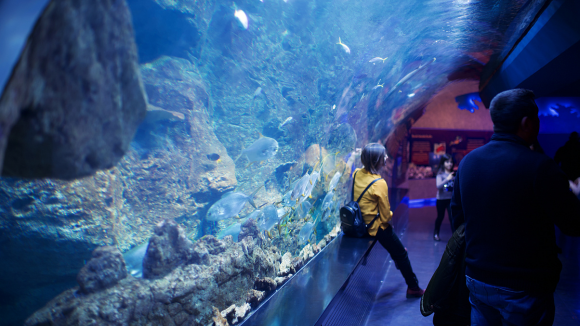Aquarium Aquaculture : What is it?
Aquarium Aquaculture : What is it?
By Izzy Shirah
Aquaculture, also known as fish farming, is the practice of cultivating aquatic nonhuman animals and plants under controlled conditions. This can include Fish, Shrimp, Mollusks, and seaweed, among other organisms. Aquaculture can be conducted in freshwater or marine environments, and can be done in a variety of systems, such as ponds, tanks, and cages.
In some cases, aquaculture can provide a source of food and income for humans, however, it can also have negative impacts on the environment and is harmful and deadly to the nonhuman animals living on aquaculture farms. Some of the ways in which aquaculture can be harmful to the environment include:
-
Pollution: Fish waste, uneaten feed, and chemicals used to control pests and diseases can all contribute to water pollution. This can harm local ecosystems and wildlife.
-
Spread of disease: Dense populations of Fish in aquaculture facilities can create conditions that are ideal for the spread of disease. If these diseases escape into the wild, they can infect wild Fish populations.
-
Habitat destruction: Aquaculture facilities can be located in sensitive habitats, such as mangroves and estuaries. The construction and operation of these facilities can destroy these habitats, which are important for a wide range of aquatic species.
-
Genetic pollution: Fish who have escaped from farms into the wild can lead to genetic pollution of wild populations. This can reduce genetic diversity and adaptability, which can make wild populations more vulnerable to environmental changes.
-
Overfishing of wild Fish populations: Many fish farms rely on wild-caught Fish to use as feed for Fish who live on farms. This can contribute to overfishing of wild Fish populations, which can have negative impacts on ecosystems and the livelihoods of people who have no other alternatives to wild Fish for a source of food and income. (What is the environmental impact of aquaculture?).
Aquariums are examples of aquaculture because they involve the cultivation and care of aquatic organisms, usually in a controlled environment. In many aquariums, Fish and other aquatic animals are raised and kept in tanks or enclosures that are intended to meet their needs for water quality, temperature, and nutrition. In some cases, commercial aquariums may also breed and raise certain species of Fish and other aquatic organisms for “conservation” purposes or to support the aquarium’s displays and exhibits. This type of aquaculture is often

referred to as “ornamental fish farming” or “aquarium aquaculture.” (Aquaculture and the Environment). Aquarium aquaculture is also used by hobbyist aquariums, where a person will keep their own aquarium for recreational purposes. Hobbyist aquariums relate to aquaculture because oftentimes, the Fish who are captive are sourced from the wild or bred in captivity. Another issue that arises from hobbyist aquariums is that they will release their invasive Fish into wild environments when their care and maintenance gets too much to handle, and those invasive species will pollute local environments. (Aquaculture : Environmental, toxicological, and health issues ), (The Aquarium Hobby Industry and Invasive Species). Aquariums can provide an opportunity for people to learn about aquatic organisms and their habitats, and can also support research into marine biology and conservation.
However, like other forms of aquaculture, aquariums can also have negative impacts on the environment if they are not managed carefully and if they use live animal exhibits. (The Benefits and Risks of Aquaculture).
For example, aquariums may use large amounts of energy to maintain water quality and temperature, and may also contribute to the demand for Fish who are wild caught and other aquatic organisms. Therefore, it is important for aquariums to implement sustainable practices and to promote responsible consumption of aquatic products.
Alternatives to live-animal aquariums that may promote sustainability include virtual exhibits or educational programs. In this age of technology, we should be able to create virtual exhibits that showcase the beauty and diversity of marine life, without using live animals. These exhibits can be interactive, educational, and engaging for visitors of all ages. (Environmental Activist Shines Light on Alternatives to Zoos and Aquariums).
Educational programs should focus on topics such as conservation, climate change, marine ecology, or marine biology. These programs can help raise awareness about preserving our environment, and focusing on marine conservation. By focusing on these strategies, aquariums can promote sustainability and responsibility without the use of live animals, while still engaging and educating visitors about the importance of conservation and the environment.



